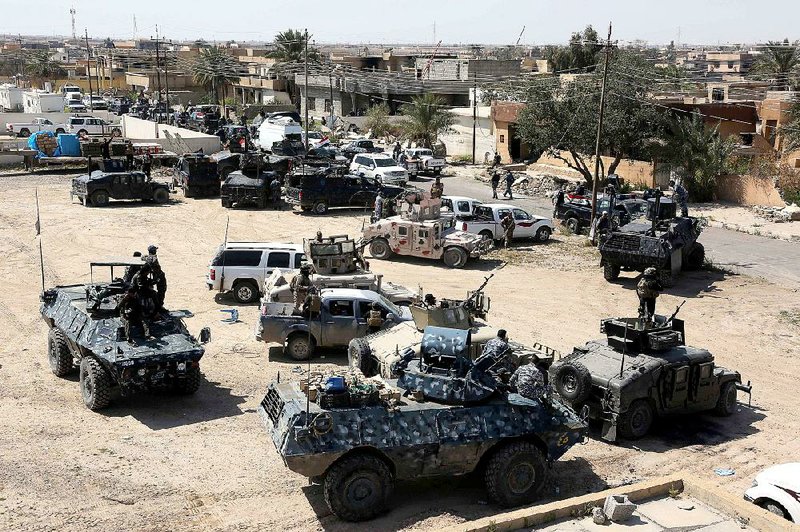TIKRIT, Iraq -- Iraqi troops started the final phase of an offensive to recapture Saddam Hussein's hometown of Tikrit on Thursday, a military official said, just hours after the U.S. launched airstrikes on the Islamic State-held city.
The push, however, is going ahead without the country's Iran-backed Shiite militias, which had been instrumental to the operation so far and which backed out in protest over the U.S. action.
Late Wednesday, the U.S. began airstrikes on Tikrit at Iraq's request and in support of the stalled ground offensive, said Lt. Gen. James Terry, the commander of the U.S.-led campaign to defeat the Islamic State.
He said the airstrikes would "destroy ISIL strongholds with precision, thereby saving innocent Iraqi lives while minimizing" unintended damage to civilian structures. ISIL is one of the acronyms for the Islamic State.
A militia spokesman, Mouin al-Kadhimy, said Thursday that many of the Shiite fighters decided to boycott the Tikrit operation because of the "harmful" involvement of U.S. airstrikes.
During the day, clashes intensified as Iraqi troops and special forces moved toward the city center, Lt. Gen. Abdul-Wahab al-Saadi said.
Late Thursday, Prime Minister Haider al-Abadi visited Camp Speicher, a military base near Tikrit, to meet with military commanders and be briefed on their progress since U.S. airstrikes began.
The Islamic State group seized the Sunni city last summer, when it took control of large swaths of Iraq and neighboring Syria. The battle for Tikrit is seen as a key step toward eventually driving the Islamic State from Iraq's second-largest city Mosul, which is farther north.
The U.S. first launched airstrikes to reinforce Iraq's military in August. It has bombed Islamic State targets in much of northern and western Iraq nearly every day since, but it had been a bystander in Tikrit because of the Iranian involvement in the operation.
The Combined Joint Task Force-Operation Inherent Resolve said in a statement Wednesday that U.S.-led coalition forces conducted 17 airstrikes approved by the Iraqi Ministry of Defense, hitting Islamic State-held targets including a building, two bridges, three checkpoints, a roadblock and a command and control facility.
A spokesman for Iraq's Popular Mobilization Units, the vast majority of which consists of Iranian-backed Shiite militias, said that a number of Shiite militias, including Asaib Ahl al-Haq, Ketaeb Hizbollah and Muqtada al-Sadr's Peace Brigades, are now boycotting the Tikrit operation because of the involvement of U.S. forces.
"Their involvement is potentially harmful to the operation," al-Kadhimy said, adding that the powerful Badr Brigade will most likely join the boycott. "We led the fight to liberate al-Dawr, to liberate al-Alam, and we are capable of liberating Tikrit without the help of American forces."
Iranian military advisers have been providing significant support since the Tikrit offensive began March 2, arming and training the Iraqi Shiite militias, which have played a prominent role on the battlefield. Militiamen make up more than two-thirds of the force fighting the Islamic State group in Tikrit.
But the top U.S. general for the Middle East said Thursday that Iranian forces and Shiite militias have left the fight and pulled back from Tikrit as a condition to U.S. involvement. Gen. Lloyd Austin told the Senate Armed Services Committee that the U.S. agreed to come in with airstrikes under the condition that the militias pull back.
Referring to the Shiite militias, Austin said, "These forces obviously were not being controlled by the government of Iraq."
The Iraqi government said it had effectively and deliberately balanced its partnerships with the U.S. and Iran, which is a neighbor.
Austin, who heads U.S. Central Command, said there now are about 4,000 Iraqi forces, commandos and police battling for the city. With American help, and without the Iranians, he believes the campaign to retake the city will move forward.
"I will not, and I hope we never, coordinate or cooperate with Shiite militias," the general told the Senate Armed Services Committee.
Information for this article was contributed by Robert Burns and Lolita C. Baldor of The Associated Press.
A Section on 03/27/2015

